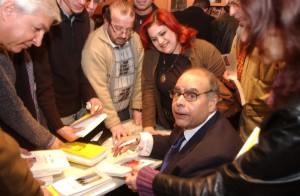Documentary review by Erini Apostolidou
The background of the story
As a Qur’an researcher Egyptian Nasr Hamid Abu Zayd was one of the leading liberal theologists in the Muslim world. In an era of rising fundamentalism his resolve to open up new interpretations of the Holy Book cost him dearly. In 1995 he was declared an apostate (infidel) by a court decision and was forcefully divorced from his wife since a Muslim woman cannot be married to a non-Muslim man. After becoming a hate figure for the islamists, he spent the remaining 14 years of his life in exile, first in Spain, then in the Netherlands, where he continued his work. He never assumed the role of the victim, because he did not want the Western media to consider him as such. On the contrary, he took a stance against islamophobia. He tried to tell people that there are various approaches to Islam e.g. rational and fundamentalist, and that other religions can also be interpreted in various ways.
The film
When director Ali Atassi first listened to Nasr Hamid Abu Zayd he was so impressed by his perspicacity and his gift for talking that he saw in him a leader against conservative Islam. He wished more people could listen to this man and so resolved to make this film. The project started with admiration but ended in conflict: why didn’t Abu Zayd return to Egypt where he was needed and take up the fight again? Why did he accept to take part in TV programmes since he knew he would be so much misrepresented?
The director’s ambition is to show the film in the Arab world. That’s why he takes for granted the audience’s knowledge of the case, since Abu Zayd’s trial was a big scandal in the mid ‘90s. However, for an audience unacquainted with the facts this is a challenging film in terms of structure. Its basic components are footage from a public talk where Abu Zayd was the guest speaker and extracts from discussions between Ali Atassi and a) Abu Zayd, b) Abu Zayd’s spouse Dr. Ibtihal Younis c) Abu Zayd’s student and spiritual son Mohammad Hakem. There is also the director’s own footage of Abu Zayd’s appearance in Al Jazeera and BBC radio in Netherlands. All these are crosscut into each other in a way that can be both interpreted as stimulating and confusing at the same time. What is certain is that Ali Atassi ended up with a gripping, even if elliptic, account of the late years in the life and work of an important contemporary figure.
This film apart from introducing us to Nasr Hamid Abu Zayd, provides food for thought in several areas. I had the chance to watch it at the Sheffield Documentary Festival. After the screening I took part in and also recorded a lively discussion between the director and the audience. Click and listen below for an insight into the following subjects:
• Film as a medium for propagating ideas
• Fight against fundamentalism
• Faith in charismatic figures vs. collective effort towards social and political change
• Attitude of media towards intellectuals – ignorance, vulgarity, arrogance
• Conventional aesthetics in film-making vs. deliberate disregard towards them
• Approach to storytelling: total exposition to the background vs. elliptical narration
• Relation between documentary film-maker and subject/protagonists in their film
Part 1:
Part 2:


